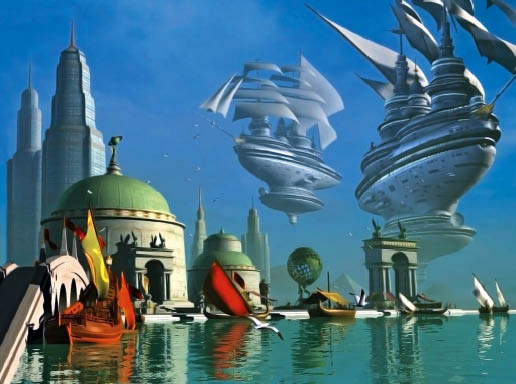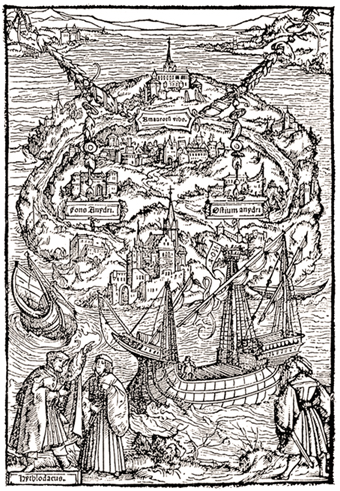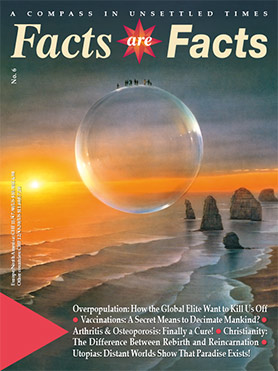Wanted: A New Utopia!
Something is rotten—not only in the State of Denmark, but on planet Earth. For maybe the first time in our history, most people no longer believe in utopias—they don’t believe that a completely different, more beautiful and better existence might be possible. In spite of that, there are utopias that exist here and now and which have been visited by people.
"A map of the world that does not include Utopia is not even worth glancing at, for it leaves out the one country at which Humanity is always landing,” wrote Oscar Wilde, the Irish playwright (1854-1900) at a time at which people still believed in utopias. The word, which comes from the Greek ou topos and which means “not yet at a historical place, but a future possibility”, has, over the course of a 20th century shaken by wars and shattered by smashed ideals, taken on another meaning in mankind’s consciousness. Thus the dictionary defines utopia as: “an impractical, idealistic scheme for social and political reform.” The Austrian aphorist Gerald Dunkl gets to the heart of the matter: “The word ‘utopia’ is usually used for something that one isn’t willing to change, not for something that one cannot change.”

The term itself goes back to the year 1516 and an “inimitable, graceful Latin”1philosophical text written by the English humanist and later statesman, Thomas More (1478-1535). The first publication was under the patronage of the famous humanist Erasmus von Rotterdam in Louvain (Belgium), with further publications following in Paris (1517) and in Basel (1518). Thomas More created a “new thesis” with this book, but took inspiration from Plato (The Republic, The Laws), Cicero and other earlier scholars.
The framing narrative is the tale of a seaman named Raphael Hythlodeus, who is supposed to have lived in the far-distant land of the Utopians for some time. The book was so influential that, from then on, every book in which a fictional, positive society was portrayed was called a utopia or a utopian novel. The first part of the work has a frame narrative in which an elaborate critique of the political and societal circumstances in Europe at the time, and especially those in Great Britain, is presented. More explains, for example, that he finds the death sentence for thieves in Great Britain to be inappropriate, as this harsh punishment will make the difference between stealing and killing meaningless to the thieves. The second part is predominantly filled with a description of the organisation of the state and the living conditions of the inhabitants of Utopia. We learn that the Utopians live in family groups, that adults practise monogamous marriage and that a generally patriarchal hierarchy, in which elders decide for the youth, dominates. Multiple families are organised into monastery-like groups, sharing kitchens and common meals. A steward, chosen yearly, looks over each group of 30 families. Private possessions do not exist; each person is apportioned the community-produced goods that they need for their personal use at no charge. Men and women work six hours per day as craftsmen. Each citizen is able to choose for himself which trade he will learn. Participating in work is compulsory and all Utopians are sent to the countryside in rotation, where they participate in the farming. Children are required to attend school. Especially gifted children are selected for a scientific or artistic education. Scientific lectures are open to the public and attending them is the Utopian’s favourite pastime. All citizens especially value universal health care. Men and women both regularly prepare for military service. War prisoners and criminals, some of who are bought off death row in foreign countries, are used as slaves. Religious tolerance pervades in the secularly organised society.
The form of government is a republic. A senate composed of term-elected officials governs every city, while the head of state is elected for life. Important issues are decided by popular vote.
In composing his work, Thomas More utilised a certain irony. This vision of utopia may seem, on many points, quite familiar to us today, but at the time, it presented a sharp antithesis to the predominate reality. We cannot really be sure whether More used irony to avoid accusations of being delusional or whether he used it to disarm the reader and minimise criticism.
In any case, More skilfully sets up an ironic game with the reader in the preface by asking if Utopia really exists or if it isn’t only just a fantasy. As mentioned above, the name Utopia alone already brings this reality into question, as it is a play on the Greek words Outopi (Οὐτοπεία) and Eutopia (Εὐτοπεία), which can be translated respectively as “no place” and “good place”.
The irony continues as the author himself appears by name in his own novel and in so doing, plays the role of the sceptical conversation partner for the reporter on Utopia. Moreover, this reporter has the unusual name “Hythloday”, which means “speaker of nonsense”. And while the Latin title announces the “best city” (De optimo statu rei publicae deque nova insula Utopia), More, as the nominal protagonist of his own work, admits that, while some things in Utopia might be desirable, he himself does not believe in the possible realisation of Utopia (in Europe) and only refrains from contradicting Hythloday’s glowing portrayal out of politeness. Thus, More adeptly keeps all the possible lines of argument in play and allows the critical reader to form his own opinion.
Utopia on the Testing Block
As already mentioned, much of More’s Utopia seems very familiar to us—for example, a republic as type of government, freely elected government officials and public voting on important issues, a society organised around family groups and (officially!) monogamous marriage, men and women work equally (although regretfully more than More’s reported six hours per day), the right to choose one’s job, required schooling for children and advancement of the most capable, universal health care, and mandatory military service (although optional for women), as well as religious tolerance in a secular state. All of these things were, at More’s time, certainly not social norms, or else it would not have been necessary to include them in his description of an ideal society.
More was, in that sense, a true visionary and his ‘fantasies’, later to become social realities, were ahead of his time, just as the French poet and politician Alphonse de Lamartine (1790-1869) wrote: “Utopian dreams are often just truths before their time.”
However, there are two aspects of Thomas More’s “utopian dreams” that mankind continues to resist making reality even today: the first is to put the interests of the individual behind those of the common good, as Utopians did. They viewed egoism, which leads to sinfulness and compulsive immorality, as the fundamental threat to the sense of community and thereby the just compensation of living conditions and communal interests. On the other hand, the age of Industrialisation produced a me-focused society such as had never before been seen, where everyone believes themselves to be the King of their own little empire and—in contrast to noble monarchs—acts, not as Life’s servants, but like (supposed) lords of fate, which should compliantly adapt to their will, if you please.
The second aspect where mankind has developed in the completely opposite direction from More’s Utopia is closely related to the first one, the emphasis on ego and socially accepted egotism: The great divide between rich and poor. In More’s Utopia, there was no private property and nothing in his model society frightened the people of his time as much as the plea of Utopia’s fictional reporter for the abolishment of private property:

Thomas More’s model, imaginary island-republic Utopia, the “happy no-place” has unfortunately become synonymous with something unreachable.
So it’s not surprising then, that the Utopians had no gold (money). Through over-production and the resulting necessary foreign trade, they nevertheless acquired foreign money, but didn’t allow it to enter their own society. They used the involuntarily received foreign money to pay mercenary troops or conduct business. For, as already mentioned, the wise Utopians themselves did not value it at all.
Greed and Money
Communists may triumphantly claim Thomas More as an advocate of their form of government: no private property, everything belongs to everyone and everyone gets about the same amount. However, the so-called communism of recent history was everything but this—first, because, once again, a small, self-selected and privileged few snatched the wealth while the masses barely had enough to live on; and secondly, because it was externally imposed, by people on people, both groups of whom had not completed the inner development that would transform them to selfless and willingly self-renouncing individuals. And whenever force has to be used, pressure results, which always ends up trampling the tender, tiny blossom of a new ideology—or utopia—to mush.
Even though mankind seems to have made great strides since Thomas More’s time in terms of the personal freedom of the individual, we now also seem to be caught and suffocating in two snares that we don’t seem to want to give up: brash egotism and greed for money, power, and goods. Interestingly, the recent economic crisis has brought us to a critical point: if mankind can manage to shed crass egotism and greed from their hearts, they will soften the hardness of the crisis and overcome it in such a way that could lead to a new consciousness of their responsibility towards their neighbours—a kind of true “confraternity”. If they don’t manage this, the noose will inexorably tighten—here around the “poor”, with ever less, and there around the “rich”, who will see themselves confronted with increasing criminality. For social chasms lead the have-nots to grab with force that which has been kept from them. Both are in the grip of fear and, instead of being there for each other and helping one another—the rich with money and the poor with work, new enemy lines are drawn that won’t be held by national borders, but which cut right through neighbourhoods and cities.
The World Is As We See It
“The magnificence of the world is always commensurate with the magnificence of the spirit that observes it,” knew the German poet Heinrich Heine in the 19th century. “The world is a prison where solitary confinement is preferred,” repined the Austrian journalist and playwright Karl Kraus in the 20th century. Both of these are commentaries on our time. The majority of people would probably recognise themselves in Kraus’ glum observation, or at least wouldn’t identify the world as truly magnificent. The majority of people have also imprisoned their spirits in bottles and tightly inserted the cork. People today pay homage to money, not to spirit. And that is why they have such a hard time seeing the world as magnificent and life as beautiful.
Sources
- 1 ranslator’s opinion in the famous German Reclam edition






